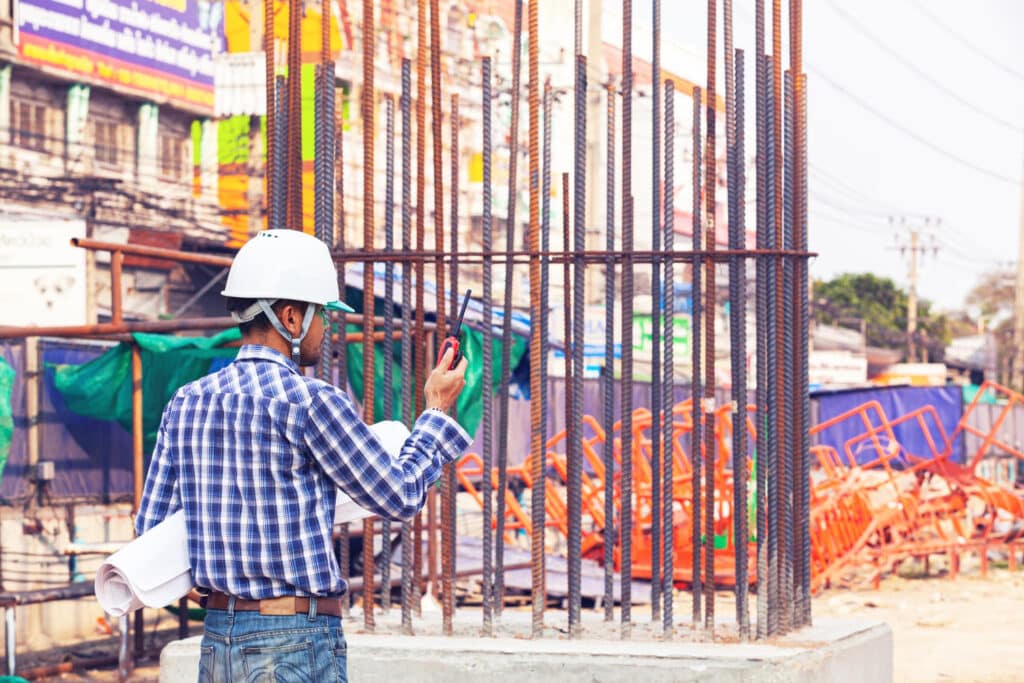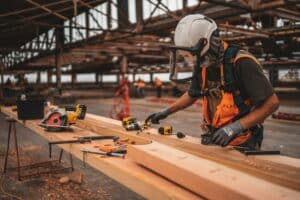Technology is transforming the construction industry in Thailand, making projects more efficient, sustainable, and innovative. Embracing modern equipment and digital tools, the construction sector is experiencing significant changes that improve project outcomes and reduce costs. Advanced technologies like drones, Building Information Modelling (BIM), and automation are becoming standard practices, enhancing various aspects of the construction process.
As we look to the future, emerging technologies such as artificial intelligence (AI) and machine learning are set to revolutionise the construction industry further. These innovations promise to enhance efficiency, accuracy, and adaptability, ensuring that Thailand’s construction sector remains at the forefront of global advancements.
Technological Innovations in Thai Construction
Modern construction equipment has significantly impacted Thai construction projects. Advanced machinery such as excavators, bulldozers, and cranes have streamlined many tasks, making them quicker and more efficient. These machines reduce the need for manual labour and improve precision, leading to better quality construction and shorter project timelines. Additionally, equipment like concrete mixers and pumps ensure consistent quality and minimise material wastage.
Drones play a crucial role in site surveys and inspections. They capture detailed aerial images and videos, providing accurate data on the site’s topography and existing structures. This information helps in planning and monitoring the project, ensuring compliance with design and safety standards. Drones also conduct inspections in hard-to-reach areas, reducing the risk of accidents and enhancing overall site safety.
Building Information Modelling (BIM) is another essential technological innovation in project management. BIM creates digital representations of buildings, allowing for detailed and accurate planning. It helps coordinate various aspects of the project, from design and materials to timelines and costs. With BIM, architects, engineers, and contractors can collaborate more effectively, identifying and resolving issues before construction begins. This reduces errors and delays, ensuring a smoother construction process.
Enhancing Efficiency and Productivity
Automation in construction processes brings numerous benefits. Automated systems like robotic bricklaying and automated welding machines increase the speed and accuracy of construction tasks. These technologies reduce human error and labour costs, making the construction process more efficient. Automated systems also handle repetitive and hazardous tasks, improving worker safety and productivity.
Prefabrication and modular construction offer distinct advantages. Prefabrication involves assembling building components in a controlled factory environment, which are then transported to the construction site for installation. This method reduces on-site construction time, minimises weather-related delays, and enhances quality control. Similarly, modular construction involves creating sections of a building off-site, which are then assembled on-site. Both methods lead to faster project completion and lower costs.
Technology improves site safety through various means. Wearable devices for workers can monitor vital signs and detect fatigue, alerting supervisors to potential health risks. Smart helmets equipped with sensors and cameras can provide real-time data on site conditions, enhancing situational awareness. Additionally, virtual reality (VR) training programmes allow workers to practice safety protocols in a simulated environment, reducing the likelihood of accidents on the actual site.
Sustainable Construction with Technology
Green building technologies are playing a significant role in making Thai construction more sustainable. Innovations like green roofs, which involve covering rooftops with vegetation, help regulate building temperature, reduce rainwater runoff, and improve air quality. Similarly, advanced insulation materials like insulated concrete forms (ICFs) and reflective roofing materials reduce energy consumption, keeping buildings cooler without excessive air conditioning use.
Renewable energy is becoming a cornerstone of sustainable construction projects. Solar panels and wind turbines are increasingly being incorporated into building designs to provide clean, renewable energy. Utilising these energy sources reduces reliance on fossil fuels and decreases the overall carbon footprint of the construction. In addition, solar water heaters and geothermal heating systems offer sustainable solutions for maintaining comfortable indoor environments.
Sustainable materials and smart waste management systems are integral to eco-friendly construction. Using recycled materials like reclaimed wood, recycled metal, and reused bricks not only conserves natural resources but also reduces the cost of raw materials. Smart waste management includes separating recyclable materials at the construction site and using construction debris to create new building materials. This approach minimises waste sent to landfills and promotes a circular economy in the construction industry.
Future Trends in Construction Technology
Emerging technologies to watch in Thai construction include 3D printing and robotics. 3D printing allows for the creation of complex building components with precision and speed, reducing material waste and labour costs. Robotics, used for tasks such as bricklaying and demolition, enhance efficiency and safety on construction sites.
The impact of AI and machine learning is profound. These technologies optimise construction processes through predictive analytics, which forecast potential issues and suggest preventive measures. For example, AI can predict equipment failures before they occur, allowing for timely maintenance and reducing downtime. Machine learning algorithms also assist in designing more efficient and cost-effective building plans by analysing vast amounts of data.
Predictions for the future of construction in Thailand suggest that technology will continue to drive innovation. With continuous advancements, we can expect increased integration of smart home systems, enhanced sustainability practices, and more transparent and efficient project management. As the sector adopts these technologies, construction projects will become safer, faster, and more cost-effective.
Conclusion
The role of technology in modern Thai construction projects is transformative, driving the industry towards greater efficiency, sustainability, and innovation. Advanced construction equipment, drones, and BIM have enhanced project management, while automation and prefabrication have improved productivity and safety. Green building technologies and renewable energy are paving the way for a more sustainable future.
As a reliable Thailand construction company, CJ Samui Builders is committed to integrating the latest technologies into our construction projects to deliver exceptional results. Contact us today to learn how we can bring your vision to life with the benefits of modern technology!




